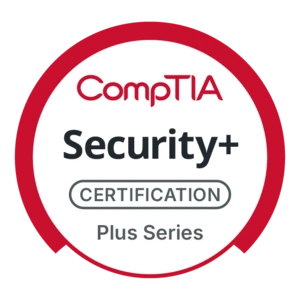Course Overview
CompTIA Security+ is a worldwide-respected certification that develops the fundamental skills required to carry out the essential security tasks and start or develop a career path in cybersecurity. This certification confirms the capacity to protect applications, networks, systems & data while guaranteeing confidentiality, integrity, and accessibility. Security+ is a practical program that focuses on actual skills that allow professionals to tackle real-world security issues. It is among the most coveted cybersecurity certifications around the world, and it is an ideal base for anyone seeking to advance within the constantly evolving security field.
Key Features Of CompTIA Security+ Training Course
- Full coverage of all of the Security+ exam objectives.
- Quality, interactive course training delivered by experts in cybersecurity.
- Actual-world labs and exercises, online and in-person classes, as well as onsite,
- Complete exam study and tests to network with fellow cybersecurity professionals
- Support for certification and exam assistance
Skills Learned
- Recognize different threats such as attacks, vulnerabilities, and vulnerabilities like social engineering, malware, and other application-based threats.
- Make use of security tools and techniques like firewalls, IDS, and endpoint security to protect systems.
- Create secure network structures, create secure designs, and comply with important security protocols.
- Manage access control and identity management, such as authorization, authentication, and financial. Perform risk assessments, implement mitigation strategies & prepare for continuity of operations.
- Learn about cryptography techniques and security functions of PKI, encryption and digital signatures for the protection of the security of data. Use security best practices, conformity standards and operational security safeguards.
Exam Details
- Exam Version: V7
- Exam Code: SY0-701
- Launch Date: November 7, 2023
- No. of Questions: up to 90 questions (multiple-choice and performance-based)
- Retirement: 3 years after the launch (expected in 2026)
- Exam Time: 90 minutes.
- Passing Score of 775 (on the scale 100 to 900)
- The languages are English, Japanese, Portuguese, Spanish, Thai
- The recommended experience is Network+ for 2 years’ experience in a security, or system administration position
- DoD 8140 Job roles include Cyber defense analyst vulnerability analyst, incident responder, assessment of security, administrator, system planner, network specialist, IT project manage,r security and information manager, assessor of secure software, etc.
Flexible Training Options to Meet Your Needs
We value flexibility in your professional development. Therefore, CounselTrain offers various study options throughout in the UAE to make certain that every learner has the opportunity to learn in the method that best suits their needs.
Target Audience
- This course, CompTIA Security+ SY0-601, is specifically designed for IT professionals who want to learn more about cybersecurity. It is ideal for support technicians, system administrators and hardware engineers, developers of various kinds, and others who find themselves doing IT tasks or involved in IT security.
- The course provides a solid foundation in security fundamentals and prepares students to take security certifications like the Security+ certification while equipping the candidates with knowledge that can be applied directly to the workplace.
CompTIA Security+ Certification Course, United Arab Emirates
This CompTIA Security+ certification is highly valued in the UAE’s digitally enabled ecosystem. As the country is en route to becoming one of the best technology hubs, cybersecurity has now become a primary concern for businesses and government agencies operating within the country. Security+ helps learners understand how to protect systems, identify weaknesses, and handle cyber-attacks with effectivity.
Fully dependent on a secure digital infrastructure, industries like healthcare, energy, banking, and technology, among others, are driving up the demand for cybersecurity experts with proper training. Security+ certification adds to the credibility of the profession, offers a host of high-growth job opportunities, and advances careers.
The investment in this course will strengthen each individual’s skills and the overall security readiness of the nation.
How To Prepare for the CompTIA Security+ Exam
CounselTrain’s training program is a systematic and effective method to prepare to take the Security+ exam. Our highly skilled instructors guide learners through each exam subject using interactive classes as well as hands-on labs that simulate actual test-taking exercises. Students can benefit from flexible study times and an environment for learning that encourages collaboration and participation.
With a long-standing track record of a number of successful candidates, the CounselTrain helps students gain the confidence, knowledge, and practical abilities required to be successful in passing the SY0-601 exam. The course helps students grow professionally and lay the base for a career in cybersecurity.
Target Audiance
- The CompTIA Security+ SY0-601 training is designed for IT professionals who are looking to gain in-depth knowledge and expertise in the field of cybersecurity.
- This training is ideal for IT support professionals, system administrators, software developers, hardware engineers, and other individuals working in the security field or performing related IT activities.
- The training provides an excellent introduction to the important principles and practices within the context of the CompTIA Security+ certification exam, ensuring that all candidates have the proper foundation to fully understand and be able to apply their knowledge when in a work environment.
CompTIA Security+ Certification Course, United Arab Emirates
The importance of the CompTIA Security+ certification course in the United Arab Emirates (UAE) cannot be overstated in today’s digital landscape. With the UAE rapidly advancing towards becoming a technology hub, cybersecurity is a paramount concern for both governmental entities and private enterprises. The CompTIA Security+ certification course equips professionals with the knowledge and skills necessary to secure networks, identify vulnerabilities, and mitigate cyber threats effectively. In a region where industries such as finance, healthcare, and energy are heavily reliant on digital infrastructure, the demand for skilled cybersecurity professionals is ever-growing. Holding a CompTIA Security+ certification not only validates one’s expertise but also opens up lucrative career opportunities in various sectors across the UAE. Therefore, investing in a CompTIA Security+ certification course in the UAE is not only beneficial for individuals seeking career advancement but also significantly contributes to the nation’s cybersecurity readiness and overall digital resilience.
How To Prepare for the CompTIA Security+ Exam
Preparing for the CompTIA Security+ exam with CounselTrain ensures a comprehensive and effective study experience. Our expert instructors provide tailored guidance, ensuring that students thoroughly cover all exam objectives. Through a combination of engaging lectures, hands-on labs, and practice exams, students gain a deep understanding of cybersecurity concepts and practical skills essential for success. CounselTrain’s flexible scheduling options accommodate various learning styles and commitments, allowing students to balance their studies with work or other responsibilities. Our supportive learning environment fosters collaboration and peer-to-peer learning, enhancing comprehension and retention of complex topics. With CounselTrain’s proven track record of success and commitment to student achievement, aspiring candidates can confidently prepare for and excel in the CompTIA Security+ (SY0-601) exam, propelling their careers forward in the field of cybersecurity.




 4.8
4.8